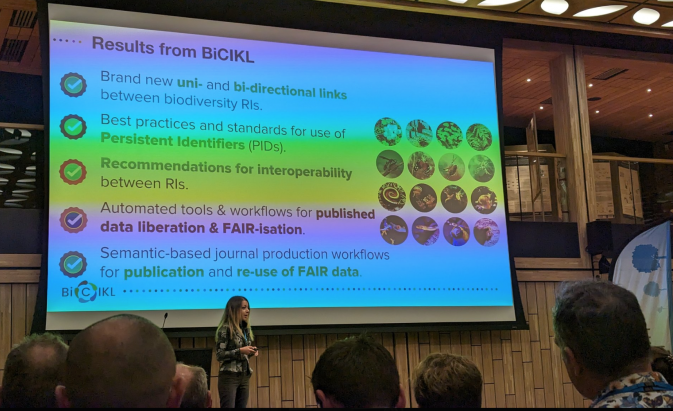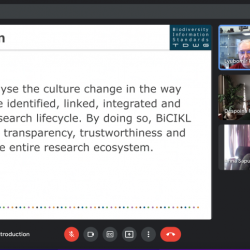Leiden - also known as the ‘City of Keys’ and the 'City of Discoveries' - was aptly chosen to host the third Empowering Biodiversity Research (EBR III) conference. The two-day conference - this time focusing on the utilisation of biodiversity data as a vehicle for biodiversity research to reach to Policy - was held at the Naturalis Biodiversity Center.
The famous for its bicycle friendliness country also made a fitting stop for BiCIKL (an acronym for the Biodiversity Community Integrated Knowledge Library): a project funded under the European Commission’s Horizon 2020 programme that aimed at triggering a culture change in the way users access, (re)use, publish and share biodiversity data.
To do this, the BiCIKL consortium set off on a 3-year journey to build on the existing biodiversity data infrastructures, workflows, standards and the linkages between them. Their final stop would be marked by the launch of the Biodiversity Knowledge Hub: a one-stop knowledge portal to interlinked and machine-readable FAIR data that use unique stable identifiers for specimens, genomics, observations, taxonomy and publications.
Recap: Empowering Biodiversity Research (EBR III) conference
On 25th and 26th March 2024, the delegates got the chance to learn more about the latest discoveries, trends and innovations from scientists, as well as various stakeholders, including representatives of policy-making bodies, research institutions and infrastructures. The conference also ran a poster session and a Biodiversity Informatics market, where scientists, research teams, project consortia, and providers of biodiversity research-related services and tools could showcase their work and meet like-minded professionals.
Amongst the ‘hot’ topics at the EBR III were novel technologies for remote and non-invasive, yet efficient biomonitoring; the utilisation of data and other input sourced by citizen scientists; as well as leveraging different types and sources of biodiversity data, in order to better inform decision-makers, but also future-proof the scientific knowledge we have collected and generated to date.
BiCIKL stops at the Naturalis Biodiversity Center
The Horizon 2020-funded project BiCIKL made quite an appearance at the EBR III conference. Many of the people who have been involved in the project over the last three years could be seen all around the beautiful venue. Above all, Naturalis is itself one of the partnering institutions at BiCIKL.
Then, on Tuesday, on behalf of the BiCIKL consortium and the project’s coordinator: the scientific publisher and technology innovator: Pensoft, Iva Boyadzhieva presented the work done within the project one month ahead of its official conclusion at the end of April.
As she talked about the way the BiCIKL consortium took to traverse obstacles to wider use and adoption of FAIR and linked biodiversity data, she focused on BiCIKL’s main outcome: the Biodiversity Knowledge Hub (BKH).
Key results from the BiCIKL project three years into its existence presented by Pensoft’s Iva Boyadzhieva at the EBR III conference.
Intended to act as a knowledge broker for users who wish to navigate and access sources of open and FAIR biodiversity data, guidelines, tools and services, in practicality, the BKH is a one-stop portal for understanding the complex but increasingly interconnected landscape of biodiversity research infrastructures in Europe and beyond. It collates information, guidelines, recommendations and best practices in usage of FAIR and linked biodiversity data, as well as a continuously expanded catalogue of compliant relevant services and tools.
At the core of the BKH is the FAIR Data Place (FDP), where users can familiarise themselves with each of the participating biodiversity infrastructures and network organisations, and also learn about the specific services they provide. There, anyone can explore various biodiversity data tools and services by browsing by their main data type, e.g. specimens, sequences, taxon names, literature.
While the project might be coming to an end, she pointed out, the BKH is here to stay as a navigation system in a universe of interconnected biodiversity research infrastructures. To do this, not only will the partners continue to maintain it, but it will also remain open to any research infrastructure that wishes to feature its own tools and services compliant with the linked and FAIR data requirements set by the BiCIKL consortium.
***
You can find the programme on the conference website and see highlights on the conference hashtag: #EBR2024.
Don’t forget to also explore the Biodiversity Knowledge Hub for yourself at: https://biodiversityknowledgehub.eu/
Follow the BiCIKL project on X and relive key moments since the project’s kick off in 2021 using the #BICIKL_H2020 hashtag.


